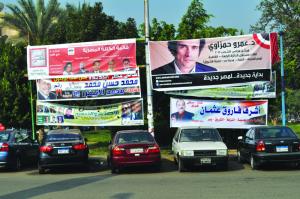AUC’s Disability Services: Accommodating to Maximize Opportunities
By: Saif Saad
@_bsaiff
As a leading academic institution accommodating students with disabilities in Egypt, AUC offers many services to help minimize barriers and maximize learning opportunities.
The Student Disability Service Unit (SDS) and the Center of Student Well-being (CSW) are responsible for the management of accommodation efforts such as the disability buddies service, which provides help with mobility on campus and note-taking during lectures, as well as social and academic support.
Office of Student Well-Being Senior Director Nabil Salibi believes that the top priority is to overcome the obstacles encountered by students with disabilities, but noted that there have been challenges.
“We have a scarcity in finding enough disability buddies. We only got eight applicants this semester, the first time in so long to have such a shortage,” Salibi told The Caravan.
Salibi added that while this is a problematic statistic, staff members are on hand to help when the office is notified of a student needing assistance and student buddies are not available. He added that this is mainly an issue which arises during early and late classes.
Students have also taken the initiative to help through founding Peers in Action, a Whatsapp group that was created by Senior Disability Buddy and Economics graduate Mina Hanna.
“We are aware of this group. We also created another group that is qualified and approved by SDS called Be My Guide that provides help on the spot. For example, if you need to go and get food, you send a Whatsapp message and someone from the group will show up to drop you off and get you back to your place,” Salibi said.
Another potential issue that Salibi highlighted is how accommodations vary as a result of faculty members having preferred methods of teaching.
In an effort to better inform faculty on how to accommodate students with disabilities and not having that interfere with their teaching style, the SDS and Center for Student Well-being host orientations each semester.
Additionally, an accessibility team is available at all times to help faculty make their material accessible to all students.
According to the United Nations Development Program (UNDP), there are approximately 12 million reported persons with disabilities (PWD) in Egypt.
One particular challenge some students with disabilities face is navigating events and workshops on campus.
Billboards and booths used to promote these events can affect those who are visually impaired due to change of direction and obstacles along the usual paths they’re accustomed to taking.
“Not all workshops go through us; when they do we give our full guidance and we also offer a map of pathways not to interrupt. In addition, we send out emails to warn students about the occasion,” Senior Specialist in the Office of the Associate Dean for Undergraduate Studies and Administration Sandra Nessim told The Caravan.
She added that the university was built in close adherence to the Americans with Disabilities Act (ADA) specifications, with the ultimate goal of satisfying the needs of students with disabilities according to professional standards.
Vice President for Student Life Deena Boraie revealed that there are some students who do not feel comfortable speaking to their professors, especially if they are facing learning difficulties.
“If you feel like your professor is going too fast and you are not understanding the content well,
you should always contact us [Student Disabilities Services in the Center for Student Well-
being] if you are uncomfortable talking to your professor. We will take the matter into our hands
immediately and remind them of the accommodations we have set or explain them once again to
support the student and deal with the situation,” said Boraie.
She also said that there are students who struggle to interact with students with disabilities.
AUC holds workshops and orientation sessions to facilitate and ease the interaction, Boraie added, but that these tend to not have a large number of attendees.
Yasser Atef, an English and Comparative Literature freshman, echoed this point about some students lacking awareness on how to accommodate students with disabilities. He elaborated that he has encountered this when clubs have planned meetings off campus without considering if the venue can be accessible for him, leading him to sometimes miss out on the experience.
Atef further emphasized that interacting with students with disabilities is not only key to being able to better accommodate but also to to avoid making assumptions or overstepping boundaries.
“When I am walking toward any area on campus, people rush to help me because of the typical stereotyping,” Atef said.
“I do appreciate your help, but you should ask first what I am in need of… Maybe I am trying to get to know the area better.”
In a previous Caravan article, Senior Career Advisor at the Career Center Caroline Nassar discussed her approach of helping students with disabilities overcome their fears. One way this is done is by working to foster a sense of community through exchanging advice and encouraging each other to boost morale.
“The main point is to elevate the idea of ‘you are not alone’,” Nassar said.



